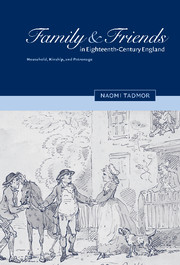Book contents
- Frontmatter
- Contents
- Acknowledgements
- A note on the text
- List of abbreviations
- Introduction
- 1 The concept of the household-family
- 2 The concept of the household-family in novels and conduct treatises
- 3 The concept of the lineage-family
- 4 The language of kinship
- 5 Friends
- 6 Political friends
- 7 Ideas about friendship and the constructions of friendship in literary texts
- Conclusion
- Bibliography
- Index
6 - Political friends
Published online by Cambridge University Press: 30 July 2009
- Frontmatter
- Contents
- Acknowledgements
- A note on the text
- List of abbreviations
- Introduction
- 1 The concept of the household-family
- 2 The concept of the household-family in novels and conduct treatises
- 3 The concept of the lineage-family
- 4 The language of kinship
- 5 Friends
- 6 Political friends
- 7 Ideas about friendship and the constructions of friendship in literary texts
- Conclusion
- Bibliography
- Index
Summary
On 8 February 1756 Thomas Turner wrote in his diary rules for a new regimen. At home, in company, or abroad he promised never to drink more than four glasses: one to toast the King's health, the second to the royal family, the third to ‘all Friends’, and the fourth to the pleasure of the company. The reader familiar with eighteenth-century expressions can guess what sort of connections Thomas Turner may have had in mind when he wrote about ‘all Friends’: these may have been the political connections in his locality. Indeed, these were no mean connections. Sussex and its small boroughs were among the main power-bases of Thomas Pelham-Holles, First Duke of Newcastle and one of the most powerful men of his time who, during the years of the diary, served as First Lord of the Treasury, and then as Lord Privy Seal. Thomas Turner's village of East Hoathly was situated in very near proximity to the Duke of Newcastle's Sussex seat at Halland House. Moreover, as the next pages will reveal, many of Turner's neighbours, fellow-tradesmen, acquaintances, and ‘friends’ were linked directly to the Duke of Newcastle's interest, and were among his active supporters. But how did eighteenth-century politics impinge upon the life of a middling and provincial eighteenth-century man such as Thomas Turner? What were the ramifications of concepts and practices of friendship in this context?
- Type
- Chapter
- Information
- Family and Friends in Eighteenth-Century EnglandHousehold, Kinship and Patronage, pp. 216 - 236Publisher: Cambridge University PressPrint publication year: 2001



